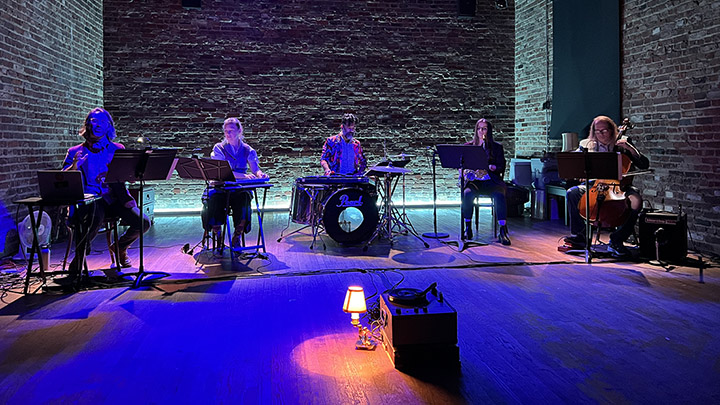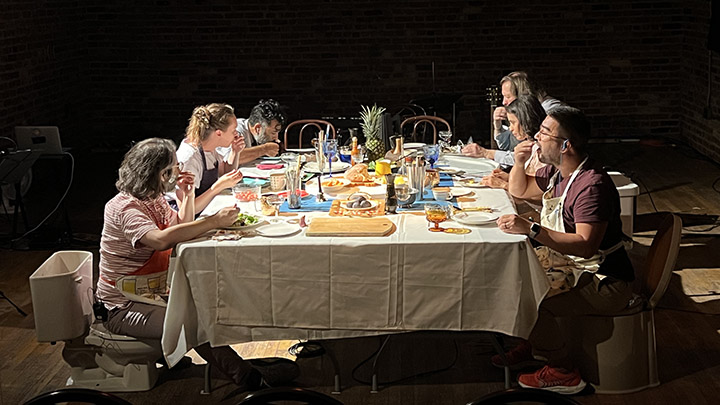In mid-August, The Exponential Festival presented two new operas from thingNY: a composer-performer collective that fuses experimental and classical sounds with theater and art installations. In Joseph White’s You Against Nature, the first of the two works, the performers are seated in front of music stands in a starkly spare black box theater. Composer White was inspired by J.K. Huysmans’s 1884 novel, À rebours, which is usually translated as Against Nature. White read this text during the pandemic and saw parallels between the novel, known as the apotheosis of the French decadent movement, and our mindsets during Covid-era social distancing.
In À rebours, the aristocratic protagonist, the wealthy aesthete, des Esseintes, who appears to have infinite time and recourses, takes us through his indulgent, sumptuous redesign of his chateau. Each chapter is devoted to a different room or hobby. Des Esseintes collects art, reflects on perfumes, furniture, travel and Catholicism, and torments and murders a tortoise by inserting gemstones into its shell. Where droves of 19th century naturalist authors strove to depict social realism or the life of the poor, at least nominally to drive social change, decadents like Huysmans or Wilde called bullshit. Truth, their works declared, lies in fantasy and imagination, in artifice and sensory pleasure: social realism with its hypocritical sallies towards Victorian wokeness be damned.
What was shocking to bourgeois tastes in 1884 feels more anxiously familiar post-2020. The hobbies, isolation, and nihilistic indulgences in White’s opera tell a Covid-era story of hedonistic self-exploration. Huysmans’s experiments in decadence are expressed by White as operatic life hacks. Using some of the most memorable selections adapted from Huysmans’s text, and adding some brilliant original scenes of his own, the text is partially sung and partially spoken, with electronic and acoustic instruments underscoring it. The opera goes at a fast clip, the scenes speeding by like a series of quick cuts in a montage sequence.
thingNY performs in the school of experimental composer Robert Ashley where there’s little differentiation between speech and singing. Dave Ruder, thingNY member and a performer in You Against Nature, described the phrasing in White’s opera, rather than the rhythm of the music, as dictating when people sing. Singers deliver the score at their own pace, and the other performers find within the phrasing itself a method of delivering their task musically. The effect is of a charged, metal, anxiety-ridden romp through the mind of one over-indulged rich sicko. It’s magical. You Against Nature is a hilarious, grotesque, mind-altering delight from start to finish, from the “mouth organ” synesthesia scene in which our hero indulges in “solos of ouzo, duos of mezcal and rum, sonatas of grappa and wild improvisations of pink gin,” to the hygiene scene in which our hero knocks himself out, Michael Jackson-like, with laughing gas so a team of doctors can perform all his bodily functions for him.
The second work in the festival was Mouthful: a staged exploration of food, digestion, and bodily frailty, seen through the lens of colonization and ancestry. The stage is set with a dining room table laden with food. The seats are all toilets, as in Luis Buñuel’s Phantom of Liberty, where the diners excrete together and excuse themselves to a separate room to eat in private. With no single librettist, composer, or director, and a fluid method of collaboration, Mouthful’s dreamlike structure takes us on a kaleidoscopic mind journey through the digestive track.
In the “Garlic Aria” a singer opines on garlic, its preparation and associations, while performers on either side of him stuff pieces of bread into his mouth in-between phrases and sometimes in the middle of phrases. Dave Ruder, who performed the “Garlic Aria” one night of the production, described it as “Inviting through food or through physical existence these ways that a lineage, be it genetic or cultural, is invited into your body and you’re having these interactions whether you’re thinking about it or not.”
Despite the collaborative process that went into Mouthful, many pieces felt like a raw expression of the performer’s link to food, family, and digestion. An especially impactful piece performed by Andrew Livingston expresses a hysterical vulnerability and rage when face-to-face with our ancestry. Riffing on a guitar he shrieks phrases like “you’re dumb, I’m smart,” his lanky hair draped over his guitar strings. Mouthful is a uniquely technical feat. All members of thingNY are excellent sound technicians and their productions are put together through technical triage alongside artfully generated musical and theatrical elements. The performers wear in-ear headsets and receive instructions while performing.
Livingston’s cri de coeur, in the middle of all this technical proficiency, is hilarious and effective. Ruder described the piece as an expression of one’s ambivalence towards one’s ancestors: a connection as well as a horror at who they were and what they did. “There’s a line in Andrew’s part that’s ‘my bowels are your bowels.’ We are the same person. I’m shitting the same thing you’re shitting. The good and the bad is all wrapped up in an incredibly messy portrait that is potentially both a physical body and an emotional state.”
Ruder’s “messy portrait” description can be applied to many of the pieces in Mouthful, where digestion, music, and family communication form the backbone of this variety show of music, speech, and technology. Both You Against Nature andMouthful enjoin us to hang out awhile in a liminal space between sense and nonsense. This space isn’t always comfortable, but time spent in it can do an excellent job of shaking loose the cobwebs in the brain and rinsing us momentarily free of the mundane.
Photos: Joseph White




